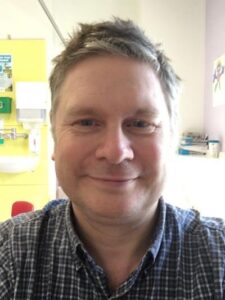Epilepsy12 – Pedal with Purpose!
Dr Colin Dunkley, Consultant Paediatrician and Clinical Lead for Epilepsy12 tells us about the recent report on the clinical and organisational aspects of epilepsies care for children and young people in England and Wales.
“Hi…can you see me?” seems to be how I introduce myself mostly these days! More formally I introduce myself slightly differently! I am clinical lead for the Epilepsy12 national audit and more locally Consultant Paediatrician and Paediatric Service Director at Sherwood Forest Hospitals.
I have often needed to find ‘headspace’ over the last six months and perhaps my best move was getting myself a new bike (via a thankyou NHS discount!) and escaping through our local old railway tracks and trails around Sherwood Forest. There has been such juxtaposition between ‘that changed’ and ‘that unchanged’ by COVID-19…it has been both freeing and disorientating to pedal between these overlying worlds.
It has been into this landscape that the RCPCH, with many stakeholders and contributors, released in September 2020 a major report on the clinical and organisational aspects of epilepsies care for children and young people within England and Wales. Although published right in the thick of the pandemic it reports findings completely pre-dating COVID-19, looking at paediatric services as they were in November 2019 and the 12 months outcomes of care of children with seizures presenting in 2018 up until January 2020. All eligible trusts and health boards registered to take part and we describe in cohort 1 the quality and outcomes of care for 3,318 different children and young people.
The good news is that there continues to be many improvements in care, particularly children having input from ‘epilepsy specialist nurses’ (ESN) and our rates of apparent misdiagnosis. We reported evidence of input by an ESN increasing now to 69% of children with epilepsy by 1 year (up from 43% and 55% in previous audit rounds) and there was a total of 158.4 WTE ESNs employed in health boards and trusts across England and Wales, compared to 147.3 in 2018 and 81.8 in the first round of the audit back in 2011. We also saw that 97.2% of children with a diagnosis of epilepsy have that diagnosis preserved by 1 year compared to 88.1% in 2011, suggesting that misdiagnosis rates are improving.
The RCPCH &Us team has worked with the Epilepsy12 youth advocates and steered us strongly towards themes around ‘contactability’ of services and to consider mental health and wellbeing and not just seizures. 48% of services still report a typical response time of three or more days when families seek advice in between clinics. Epilepsy care provision is still not commonly embedded alongside mental health and educational provision. Interestingly, both of these issues may be helped by the rapid developments towards virtual working and different models of remote clinics. In a time of bubbles and distancing it has been interesting to see how long-needed communication ‘bridges and tunnels’ have emerged.
The Epilepsy Quality Improvement Programme (EQIP) has seen 12 local epilepsy teams work together to construct, deliver and showcase tangible improvements in a broad range of areas for their service. Transition, first seizure pathways, information resources, EEG success and timeliness are examples of focus. It has been heartening to see how the passion to join together and collaborate has proved so resilient through the pandemic and has switched so readily to virtual meetings and conferences
Take a look at the Epilepsy12 reports. Even better, look at the results spreadsheets in the downloads section on that web page and work out where you and your local service fits in.
Our challenges going forward are beginning to reveal themselves. COVID-19 is not only impacting on the health and provision for children with long-term conditions like epilepsy but also challenging our ability to describe this impact and prioritise provision further. Programmes like Epilepsy12 are one way to measure and describe this impact and balance our focus to see both COVID and non-COVID worlds. We need to see the waves of data flow clearly for all significant health conditions, keep the child and their world in our sights, and pedal with purpose and balance through this most difficult of times.

